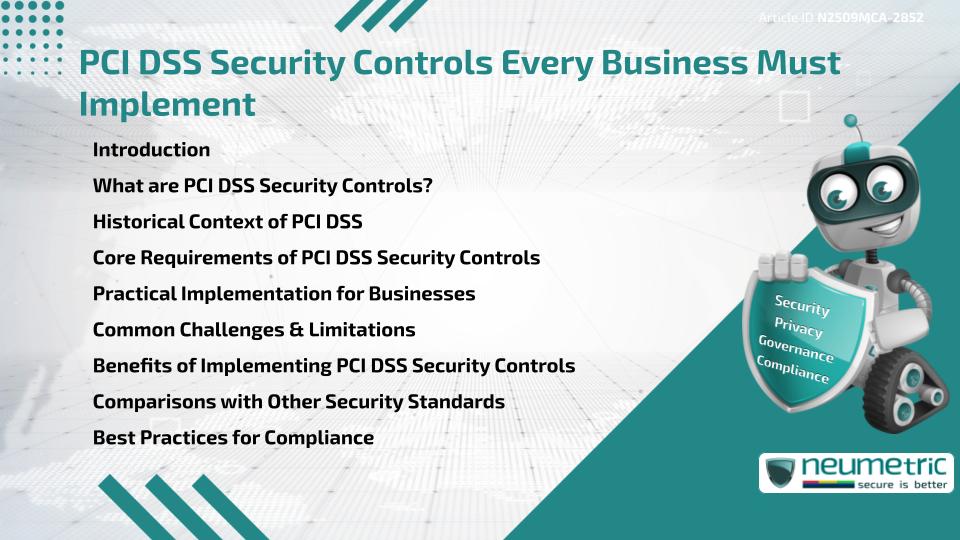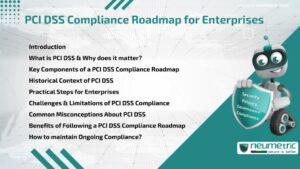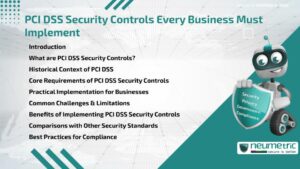Table of Contents
ToggleIntroduction
PCI DSS Security Controls are a set of essential measures that safeguard Cardholder Data & protect businesses from Breaches, Fraud & Non-compliance penalties. These controls apply to any organisation handling credit card transactions, regardless of size. They ensure that Sensitive Payment Data remains secure, help businesses maintain Customer Trust & provide a recognised Standard of Compliance. In this article, we explore what PCI DSS Security Controls are, their history, key requirements, challenges & Best Practices every business should adopt.
What are PCI DSS Security Controls?
PCI DSS stands for Payment Card Industry Data Security Standard. Its Security Controls are a structured set of requirements designed to secure credit card data. These include Policies, Technologies & Procedures that reduce the Risks of unauthorised access. Whether through Firewalls, Encryption or regular Monitoring, the controls act like a lock & key system ensuring that only authorised parties access Sensitive Information.
Historical Context of PCI DSS
The Payment Card Industry introduced PCI DSS in 2004 after a series of major credit card breaches raised global concerns. The founding members included Visa, Mastercard, American Express, Discover & JCB. Their goal was to create a unified Standard to protect Cardholder Information & reduce Fraud. Over time, PCI DSS Security Controls evolved to address new Risks, making it one of the most comprehensive Frameworks for payment security.
Core Requirements of PCI DSS Security Controls
PCI DSS Security Controls are organised into twelve (12) broad requirements, such as:
- Installing & maintaining Firewalls
- Protecting stored Cardholder Data
- Encrypting transmission of data across networks
- Using strong Access Controls
- Monitoring & Testing systems regularly
- Maintaining an Information Security Policy
Each requirement builds a layered defense against Data Breaches, similar to multiple security checkpoints in an airport.
Practical Implementation for Businesses
Implementing PCI DSS Security Controls is not just a technical exercise but an organisational effort. Small Businesses may use Third Party payment processors to offload some controls, while larger firms may need in-house systems & teams. Practical steps include conducting Risk Assessments, Training Staff & using Compliance tools to streamline Audits. For example, encrypting data both at rest & in transit ensures that even if attackers gain access, the information remains unreadable.
Common Challenges & Limitations
Businesses often face difficulties when implementing PCI DSS Security Controls. Some challenges include:
- High costs of upgrading systems
- Lack of technical expertise
- Resistance from staff unfamiliar with security procedures
- Constantly evolving Threats
While the Framework is effective, it is not foolproof. Compliance does not automatically mean immunity from cyberattacks, but it significantly reduces Risks.
Benefits of Implementing PCI DSS Security Controls
Adopting PCI DSS Security Controls provides multiple benefits:
- Enhanced protection against fraud
- Avoidance of heavy fines & penalties
- Improved Customer Trust & Brand reputation
- Streamlined processes for handling Sensitive Data
These benefits far outweigh the challenges, making Compliance a wise investment for any business.
Comparisons with Other Security Standards
Unlike general Frameworks such as ISO 27001 or SOC 2, PCI DSS Security Controls focus specifically on payment data. ISO 27001 covers broader Information Security Management, while SOC 2 evaluates controls related to service Organisations. PCI DSS remains unique for its mandatory Compliance for any business handling credit card data.
Best Practices for Compliance
To stay compliant with PCI DSS Security Controls, businesses should:
- Conduct regular Internal & External Audits
- Keep systems updated with the latest Patches
- Provide ongoing staff training
- Partner with Vendors that also maintain PCI DSS Compliance
- Document & review Security Policies frequently
Conclusion
PCI DSS Security Controls are vital for businesses of all sizes. They provide a structured approach to safeguarding Payment Data, protecting Customers & maintaining Trust. Despite challenges, businesses that implement these controls effectively can reduce Risks & strengthen their overall Security Posture.
Takeaways
- PCI DSS Security Controls safeguard Cardholder Data.
- Compliance is mandatory for businesses handling card payments.
- Implementation requires technical & organisational effort.
- Benefits include reduced Fraud, Trust & Regulatory Compliance.
- Best Practices ensure long-term adherence to the standard.
FAQ
What is the purpose of PCI DSS Security Controls?
Their purpose is to protect Cardholder Data & reduce the Risk of payment fraud.
Are PCI DSS Security Controls mandatory?
Yes, Compliance is mandatory for all merchants & service providers handling payment data.
How often should PCI DSS Compliance be validated?
Compliance validation typically occurs annually, with quarterly scans for certain businesses.
What happens if a business does not comply with PCI DSS Security Controls?
Non-Compliance can lead to fines, increased fees, reputational damage & even loss of ability to process card payments.
How do PCI DSS Security Controls differ from other Frameworks?
Unlike ISO 27001 or SOC 2, PCI DSS is specifically tailored to payment card Data Security.
Can Small Businesses outsource PCI DSS Compliance?
Yes, by using Third Party payment processors, Small Businesses can reduce their Compliance burden.
Need help for Security, Privacy, Governance & VAPT?
Neumetric provides organisations the necessary help to achieve their Cybersecurity, Compliance, Governance, Privacy, Certifications & Pentesting needs.
Organisations & Businesses, specifically those which provide SaaS & AI Solutions in the Fintech, BFSI & other regulated sectors, usually need a Cybersecurity Partner for meeting & maintaining the ongoing Security & Privacy needs & requirements of their Enterprise Clients & Privacy conscious Customers.
SOC 2, ISO 27001, ISO 42001, NIST, HIPAA, HECVAT, EU GDPR are some of the Frameworks that are served by Fusion – a SaaS, multimodular, multitenant, centralised, automated, Cybersecurity & Compliance Management system.
Neumetric also provides Expert Services for technical security which covers VAPT for Web Applications, APIs, iOS & Android Mobile Apps, Security Testing for AWS & other Cloud Environments & Cloud Infrastructure & other similar scopes.
Reach out to us by Email or filling out the Contact Form…





